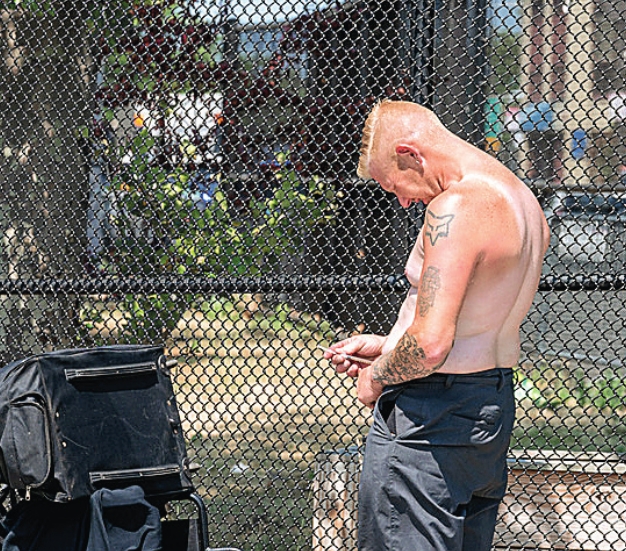
City officials received an immediate surge of public resistance to a proposal to locate a fourth shelter in the South End, regardless of assurances of nonpermanence that stakeholders view with suspicion at best.
The need for more beds has
sprung up ahead of a planned crackdown on Atkinson Street, where
officials say they will finally eliminate tents and ramp up drug
trafficking enforcement. That will, however, leave around 30 people who
are far into the process of getting housing but will nevertheless have
no place to stay.
Planners
have settled on 725 Massachusetts Avenue as the spot for a new,
allegedly temporary space for them to stay until they find permanent
shelter. The spot is tucked into the heart of the Boston Medical Center
(BMC) and would not on-site tolerate drug use or weapons, employing one
security guard within and two without to dissuade infraction.
That’s
unfortunately where officials’ history of policy reversals catches up
to them. The plan strikes many as almost exactly the same as the
Roundhouse shelter, a wildly divisive program initially pitched as a
temporary winter shelter that ended up providing clinical services and
housing next to the drug market for years.
Some
local stakeholders say that the Roundhouse not only failed to
noticeably affect the encampment but actively made things worse by
keeping former addicts next to the state’s largest open-air drug market.
It also further centralized services there, something the city
officials seem to oppose right up until the moment they suggest more
shelters nearby.
Security
was a constant complaint with the Roundhouse, and comments at an August
22 meeting of the South End Working Group aren’t likely to assuage
fears that the new shelter would be more of the same. City officials
specifically referenced consulting BMC, who managed the Roundhouse
during its controversial run, on how to organize security for the new
shelter.
There were no
comments at the working group meeting supporting the shelter except
those from city officials. John Moran, the state representative for the
9th Suffolk District, said he would fervently oppose any effort to
locate more services in the South End.
“We
have no doubt that you want to do the right thing for the city, but I
want to be really clear. The South End already has three shelters. I
will not allow a fourth shelter to happen here,” he said. “I called Pine
Street Inn yesterday and you hadn’t even contacted them. Don’t tell me
you’ve been calling all around the city looking for solutions.”
“We’ve
heard all this before, the exact same story over and over again, and
what we got was Mass and Cass and Atkinson Street back again. Locating
more housing units around Mass and Cass doesn’t work,” said Steve Fox,
head of the South End Forum. “The Roundhouse was not a success, it
actually contributed to the nexus of activity at Mass and Cass today.
There’s a lot of skepticism in this community of ‘temporary’ shelters.
More than skepticism.”
Dr.
Bisola Ojikutu, the executive director of the Boston Public Health
Commission, did contest the claim that the city had not been in contact
with Pine Street Inn, saying they’d “been in touch with Pine Street
frequently.”
She and
other officials emphasized they’ve been searching for an alternative for
weeks, and a 30-bed shelter on Massachusetts Avenue is the only viable
option.
The meeting
ended with Moran repeatedly and unsuccessfully pressing Ojikutu to
commit to finding the beds elsewhere. Several alternatives were
proposed, including distributing the extra beds throughout existing
shelters or delaying the crackdown several months until the Recover
Boston plan has a chance to give people a place to go, but officials
seemed resigned to using Massachusetts Avenue.
“I’m
happy to talk further. Like I said, we’ve evaluated the spaces that are
available and worked for the last few weeks to get this ready, but I’m
always ready to talk more. You’re important collaborators,” said
Ojikutu.